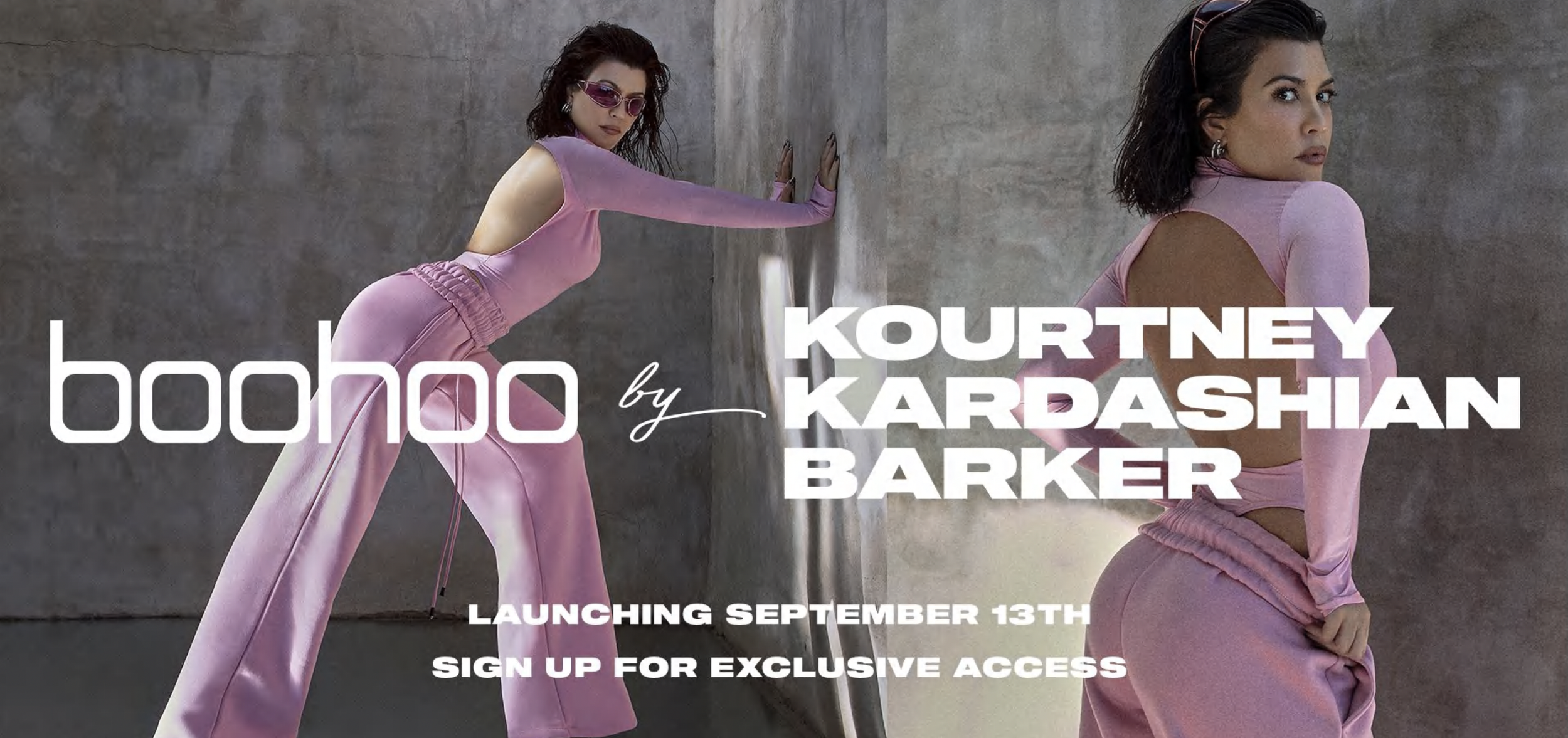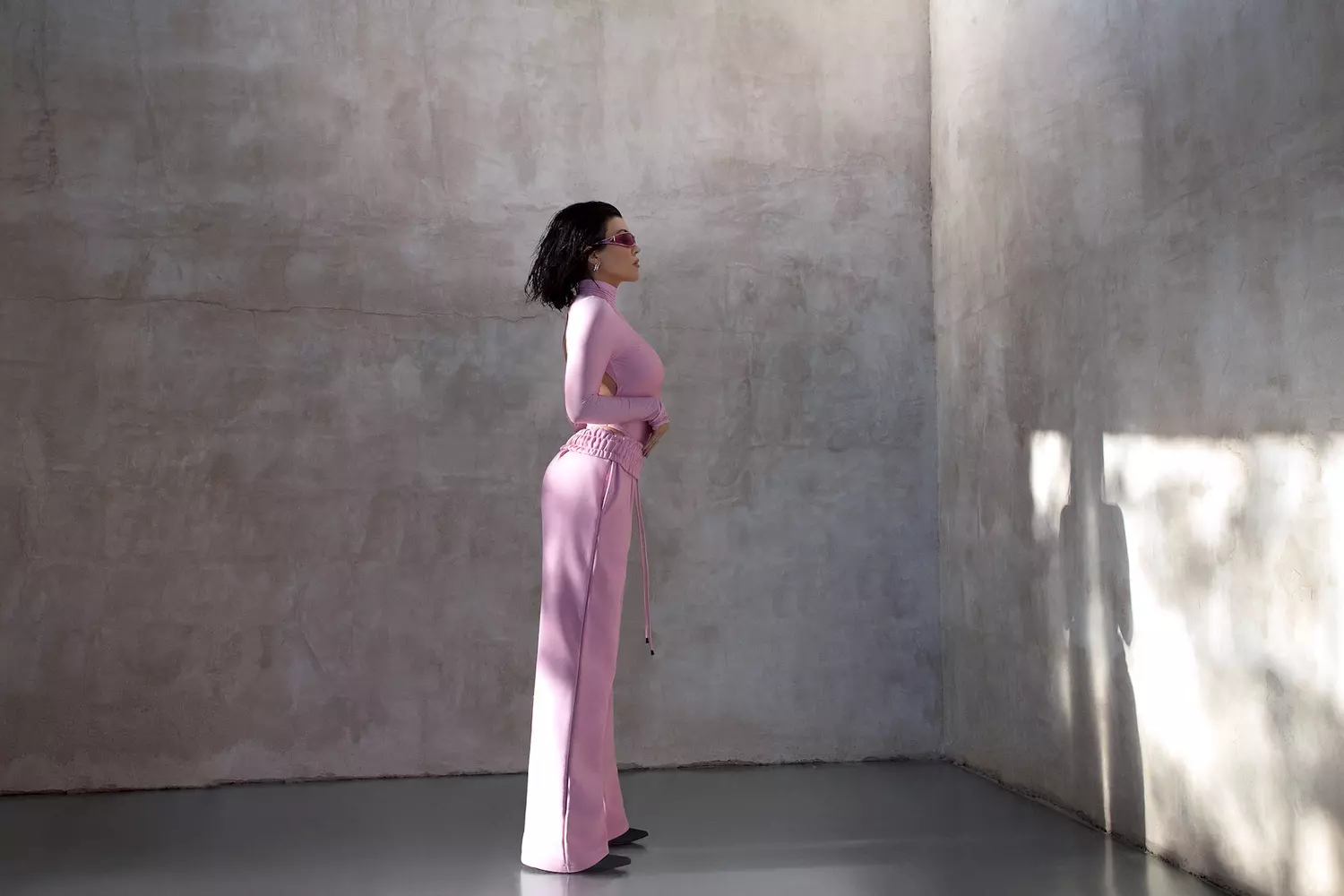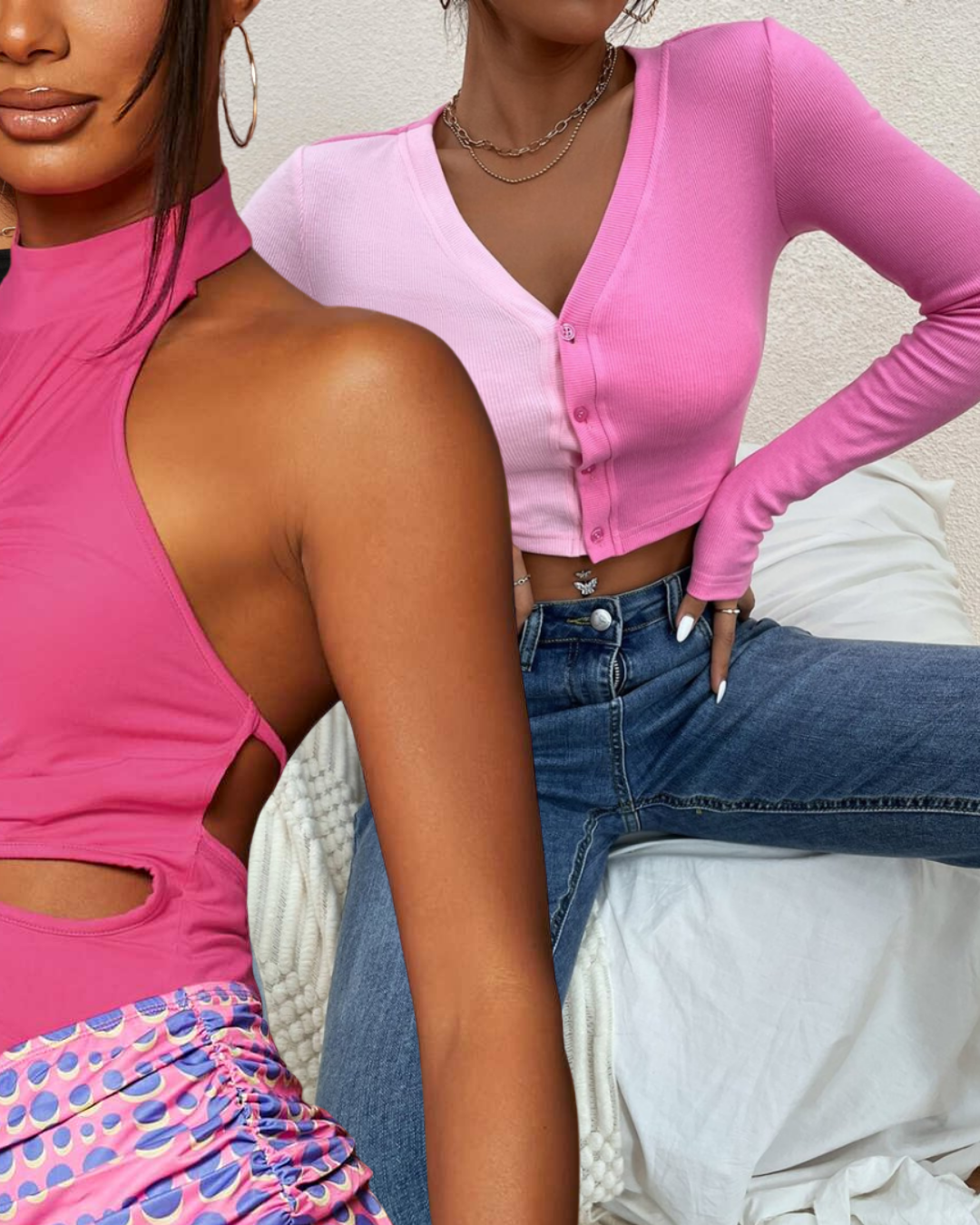Boohoo Announces Kourtney Kardashian Barker as Sustainability Ambassador Sparking Questions About the True Value of “Awareness”
Kourtney Kardashian Barker for Boohoo.
Yesterday, global fast fashion e-tailer, Boohoo announced Kourtney Kardashian Barker as its new sustainability ambassador along with plans to release two sustainability-inspired capsule collections “created in tandem with a journey of investigation into opportunities for creating a more sustainable fashion future.”
The first limited edition 45-piece collection, priced between $6 and $100, will be unveiled during New York Fashion Week on September 13th at a “see now, buy now” presentation and will later be available exclusively on Boohoo.com. Of the 45 items, 41 contain recycled cotton. Others include “traceable cotton and recycled polyester.” While the initial press release didn’t mention what percentage makes up the recycled content or what qualifies the cotton as traceable, Boohoo said that customers will receive “clear information about how their garments are made.”
Boohoo’s announcement comes on the heels of the UK watchdog, Competition and Markets Authority (CMA), announcing its investigation into Boohoo and other fashion brands over claims about the sustainable nature of its products and potential greenwashing. It also trails repeated allegations of forced labor in the Leicester apparel-producing region where Boohoo makes the majority of its products. These claims led to a loss of 23% of Boohoo’s value in one day, equating to $1.35 billion in losses.
As part of the partnership, Boohoo will release a social content series following the year-long project with Kardashian-Barker, giving a “first-hand account of the experts they met on and off camera, the conversations they had, what they discovered, and how this continues to inform the project and the boohoo brand.”
Kourtney Kardashian Barker for Boohoo.
“When Boohoo first approached me to collaborate on a line, I was concerned about the effects of the fast-fashion industry on our planet,” said Kardashian Barker in a press statement. “Boohoo responded with excitement and a desire to incorporate sustainable practices into our line. I’m grateful for the opportunity to use my platform to drive conversations that lead to ongoing change and use my voice to share actionable tips with consumers on how we can play our own part. There’s still lots of work to be done and improvements to be made, but I truly believe that any progress we can make when it comes to sustainability is a step in the right direction and will open up the conversation for future advancements.”
Indeed, raising awareness about the fashion industry’s negative environmental and social impact is a vital part of the movement. Though the onus shouldn’t be entirely on consumers to fix fashion’s broken system, shoppers do play a crucial role in the industry’s sustainable future.
For years, the fashion industry has mainly been accountable to itself, relying on voluntary commitments to tackle its negative impact on people and the planet. However, despite some increased efforts, greenhouse gas emissions are still rising, garment workers are still being exploited, brands are still overproducing, and ultra-fast fashion giants are growing.
Activists have long warned that relying on voluntary action to address social and environmental impact is misguided. Many believe a system where profit-driven companies can set their own benchmarks with little accountability will never be enough to create transformative change. Instead, an unwavering shared commitment is needed to achieve tangible progress — and that commitment will only come from economic incentives and government regulation.
Still, customer participation is vital to the success of sustainability initiatives, and this participation begins with awareness of the challenges and opportunities of sustainability in fashion in a way that’s easily understood and accessible to all.
With 196M+ followers on Instagram and 6.5M on TikTok, partnering with Kardashian Barker is an opportunity to drive conversations about sustainability, educate consumers about the power of mindful consumption, and empower them to make more informed choices. After all, awareness leads to action.
But does it?
In a 2021 Zalando report exploring the attitude-behavior gap between consumers’ sustainability intentions and actions, the company found that while 60% of survey respondents said transparency is important to them, only 20% actively seek out information as part of the purchasing process; 53% believe ethical labor policies are important, but only 23% investigate what those policies are; 58% believe they should understand the product, including the materials, but 38% regularly check the label for information; and 60% of consumers say repair, second-hand and sustainable disposal are important to them, but only 23% repair their clothes and 25% regularly buy second-hand.
Study after study has shown that despite awareness about sustainability and growing concern among consumers, there’s an attitude-behavior gap between consumers’ intentions and actions. Consumers want environmentally sustainable and ethically-made products and are willing to pay more for them. Still, their purchasing decisions aren’t reflecting their values.
In a 2019 paper written by Katherine White, Professor of Marketing and Behavioral Science at the University of British Columbia, Rishad Habib, a Ph.D. student at the Sauder School of Business at the University of British Columbia, and David Hardisty, Assistant Professor of the Marketing University of British Columbia, it’s argued that one of the reasons for this attitude-behavior gap is that consumers often perceive sustainability as a sacrifice.
Kourtney Kardashian Barker for Boohoo.
Whether it’s the increased effort of having to research brands’ sustainability qualifications, the increased cost to shop sustainably, or the perceived lack of aesthetics in sustainably-made options, shoppers don’t want to give up their wants to prioritize entities that are outside of themself like other people, the environment, future generations, etc.
Research shows that we conceptualize things that are psychologically distant from us more abstractly than psychologically close things. For example, when there are weather disasters that could very well reflect climate change (like wildfires, floods, or extreme storms), these disasters tend to happen far away from where many people live. As a result, most people are not forced to deal with the specifics of climate change and can treat it as an abstract concept.
Similarly, despite increased awareness, consumers don’t want to give up the short-term feelings, emotions, and potential social status associated with buying into trends and uninhibitedly expressing themselves through fashion for the abstract purpose and long-term benefit of doing better for people and the planet. Therefore, they will choose and use products and services to satisfy their wants and needs rather than adjust their habits to prioritize entities outside themselves.
Acknowledging that there’s still work to be done and improvements to be made, Kardashian Barker shared her sentiment that any progress we can make when it comes to sustainability is a step in the right direction. However, many people are calling the Boohoo/Kardashian Barker partnership greenwashing and a last resort to virtue signal sustainability, following public criticism of Boohoo’s business practices, allegations of labor rights violations, and plummeting share prices.
Critics also pointed out that in addition to the unsustainable nature of Boohoo’s linear business model, the Kardashian/Jenner/Barker reputation for excess dilutes any sustainability message the partnership could hope to have.
One person commented underneath Boohoo’s post announcing the partnership: “How can we do better? - for starters, stop producing so much unnecessary clothing and start paying your workers fair wages instead of throwing it at a multi-millionaire who doesn’t actually wear boohoo clothing in her everyday life.”
Another added, “Everything about this is so so vile. It could not be clearer that literally NO ONE involved in this campaign actually cares about “like, worker welfare and textile waste” 🥴”
Fair fashion campaigner Venetia La Manna wrote, “would absolutely love to see you use the money you spend on these misleading marketing campaigns to actually 🌸pay the people who make your clothes🌸”
Another wrote, “Positive change would be to stop overproducing poor quality clothes made by underpaid workers. Step one. Don’t need more awareness. The world is aware.”
Kourtney Kardashian Barker for Boohoo.
Let’s talk about awareness.
In a press release, Carol Kane, Co-Founder and Executive Director of Boohoo Group said, “when we spoke to the experts from across the industry, everyone said education was the key. We could all see this was quite a unique opportunity to speak directly to millions of people across the globe and deliver something we don’t believe has been done before.”
In a LinkedIn post, Rosie Howells, Boohoo’s Head of Sustainability wrote, “Today boohoo announced our collaboration with Kourtney Kardashian Barker. She will be learning and talking about the big issues in sustainability and fashion. I know people may be skeptical about this, but for me, it is the most unbelievable opportunity to raise awareness about issues like textile waste, worker welfare, and materials with millions of people globally.”
Francis Egleton, Corporate Affairs Manager at Boohoo, reposted Howells’ Linkedin post, writing, “All too often, these types of conversations happen on the fringes. This campaign will blow that wide open. There aren't many people alive today who have the reach and ability to influence as many people as Kourtney does. Using that platform to get people thinking about these complex issues and how we solve them has the potential to be very powerful.”
Indeed, there’s something to be said for the campaign’s ability to introduce the ideals of sustainability to those who might not have otherwise paid attention. However, the quality of said education from the Boohoo/Kardashian Barker collaboration remains to be seen as the partnership is already promoting unnecessary consumption, prompting consumers to shop Boohoo’s regular offerings while they wait for access to the collection.
Boohoo encourages customers to shop the brand’s regular offerings while they wait for access to the collection.
“If industry professionals aren’t being critical about these sorts of partnerships, they only continue to perpetuate the harmful impacts of the fashion industry while condoning blatant greenwashing,” said Kestrel Jenkins, industry vet and host of the Conscious Chatter podcast referring to the industry professionals that supported Howells and Egleton’s posts. “If you’re working in the *sustainability* space, patting folks on the back for celebrity partnerships isn’t it — when will we get beyond the sparkly facade of capitalism/consumerism and truly start putting in the work behind the scenes?”
When influencers first came on the scene, brands paid them in free products and exposure until content creators quickly realized they couldn’t directly pay their rent or buy groceries with the exposure they got from being featured by the brand or with the butterfly mesh print midi dress they were #gifted. Similarly, garment workers can’t provide for their families with TikTok views or feel-good Instagram captions about unknown amounts of recycled polyester and “traceable cotton” used in 41 out of the 8,155 dresses, 10,192 tops, 1,925 two-piece sets, and 2,762 new arrivals currently listed on Boohoo’s site.
Certainly, educating consumers and future leaders is critical to systemically transforming the fashion industry. However, in the presence of the attitude-behavior gap between what people say they care about and what they actually do, what is the true value of awareness? How can we take the awareness and the conversation this collaboration has already spurred and turn it into action that will drive actual change in consumer behavior?
What do you think? Share your thoughts and join the conversation happening now.















